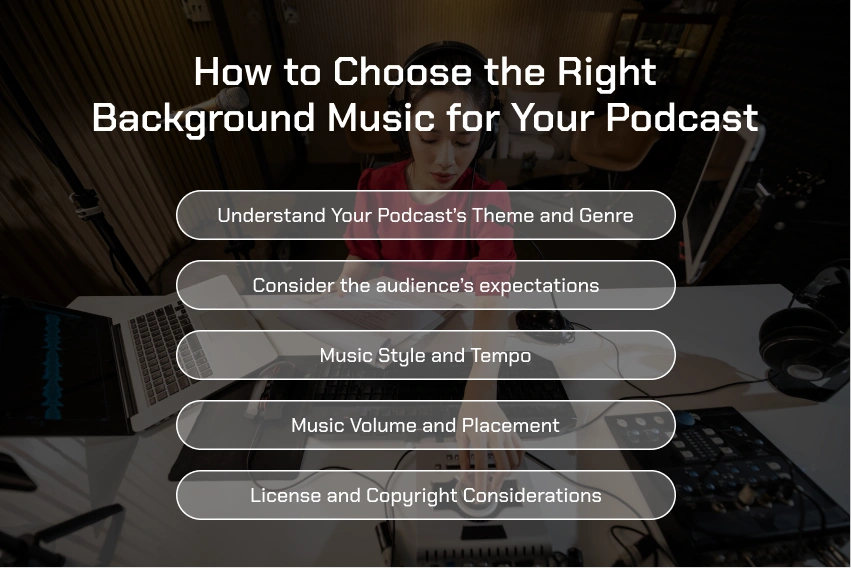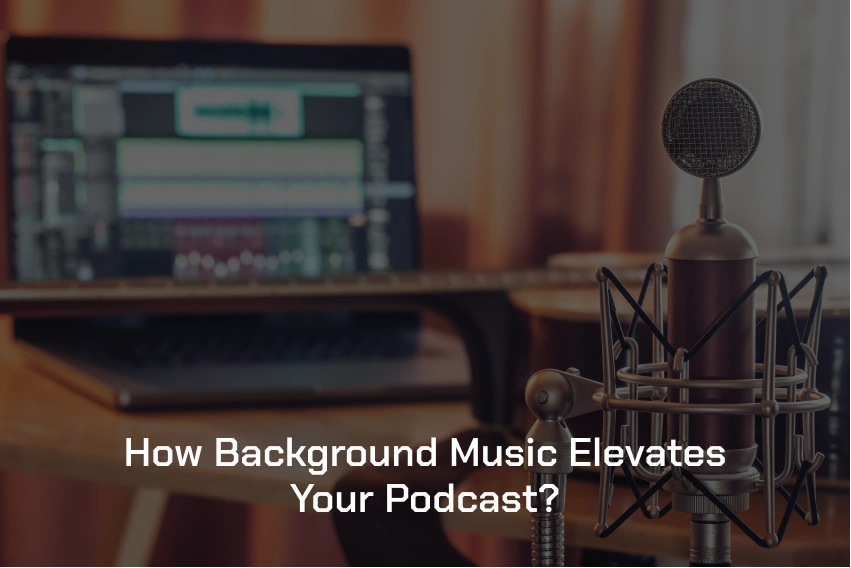In the podcasting sphere, audio is a crucial ingredient which contributes towards developing interest and attraction in the listeners. Particularly, music can be great for your podcast since it provides an atmosphere, deepens the narrative and connects emotively with the audience.
In this guide, we will look at the role of music in the podcast, give guidelines on how to select suitable music, and explain how to add the selected music to the podcast without any problems.
Read More About 10 Best Studio Monitors For Mixing: The Ultimate Guide
Why Background Music Matters
Background music performs several important functions in podcasts:
- Creating the right mood and atmosphere: Mood music creates feelings and emotions which are needed for certain podcasts. For instance, cheerful music can give birth to a lively and exuberant environment whereas gentle music can help induce a state of meditation.
- Enhancing storytelling with music: Music for emphasis changes the mood with respect to the story being told, capturing key events and moods of the listeners.
- Establishing emotional connection with listeners: The right background music also cuts across effective communication to the audience as well as developing a loyal audience.
- Reinforcing brand identity through sound: In addition, habitual usage of specific background music will have a positive effect in creating a brand for the podcast.
| Discover free rap and hip hop beats at JBZ Beats and learn how to boost your production quality with expert tips! Buy Exclusive Beats Online Now |
Choosing the Right Background Music for Your Podcast

Understanding Your Podcast’s Theme and Genre
The first step in the process of selecting background music is to identify the genre and theme of the particular podcast. Let’s say, for instance that, in a podcast that is focused on humor: fast and bright tracks will help the processes a lot, while a podcast of a more meditative nature will require more soft and quiet ambient sounds.
Considering the audience’s expectations
Focus on your, audience and what they like. Which genre captures the kind of listeners? With the right music, the audience’s experience can be elevated.
Music Style and Tempo
- Selecting music that complements the topic of each episode: Consider the themes in music that would appertain to the subject matter of each episode. Like, we usually relate with the wind of change but this probably encourages more serious music.
- Choosing a tempo that fits the podcast’s pace: The speed that the music is played should correspond with the rate at which you are presenting your podcast. Upbeat music would be good if the program is very active while mid tempo or slow music would be appropriate if the program is casual.
Music Volume and Placement
- Ensuring music doesn’t overpower the voice: The music should be worked upon at a level that supplements the spoken words but does not overwhelm them. This ensures that the voice gets heard despite the background music.
- When to use music: Given any thought, there are music episodes that can be used at the commencement and the conclusion of episodes as well as during segment change overs. Additionally, music can be used to draw attention to certain events or sweeten or intensify the emotional load.
Licensing and Copyright Considerations
- Where to find royalty-free music or licensed tracks: There is a host of websites that charge no fee for music while some fall under the licensed category. Some of the recommended sites include AudioJungle, PremiumBeat, and Artlist.
- Importance of legal compliance for podcast music: It is necessary to make certain that sufficient rights are obtained for incorporation of music into the podcast. The use of pictures or music that is copyrighted and not granted for use can be detrimental.
Read More About From Studio To Stage: Mastering Your First Live Hip Hop Performance
Different Uses of Background Music in Podcasts
Intro Music
- Setting the tone from the start: It goes without saying that the introduction to the podcast shall contain an ‘intro music.’ The introductory part ought to be honest, interesting and proper throughout the series.
- Creating a memorable and consistent opening: A very useful element is that the listeners will be able to hear the tune of the podcast and recognize that it’s this very podcast.
Background Music During the Episode
- Enhancing storytelling and emotional moments: Music can serve to advance a plot and make the audience feel certain emotions. For instance, during a suspense filled narrative, especially in movies, a background score is employed to increase the tension, or in a scene where there is a build-up of feelings, it would be a good thing to use a soft tune.
- Filling pauses or transitions between segments: The use of background music may help eliminate inertia between segments.
Outro Music
- Wrapping up the episode with a lasting impression: The last part of the episode focuses on the final music piece which serves as the concentration of the episode.
- Driving home calls-to-action with fitting music: In the event that there is concern raised to the listeners at the end of the episode, such actions should be accompanied with music that is in line with the concerns.
| Explore top-tier free rap and hip hop beats on JBZ Beats, along with valuable insights to help you make smarter music production decisions! Buy Hip Hop Beats Now |
Best Practices for Incorporating Music into Your Podcast
Subtle vs. Noticeable Music
- Knowing when to use subtle music vs. noticeable tracks: Choosing between subtle and ‘in your face’ sounds almost entirely depends on the context. ‘Inconspicuous’ sounds can be used to enhance the background while ‘conspicuous’ sounds can be used to highlight a particular time.
- Avoiding distractions by keeping music at an appropriate level: Try to ensure that the volume of the music does not get too high or is such that it is not irritating. It has to be harmonious with the speech, not competing with it.
Frequency of Music Use
- Balancing music with the spoken word: Do not use a lot of music as it may become a source of disturbance to the audience. Do not make music the main feature of your podcast; instead, pepper it with the requisite help of the music.
- Avoiding overuse of background music: Amount one component and the other as regards spoken word and reactess to the vert concentration while into one pleasant audio.
Editing Tips for Seamless Integration
- Tips for smooth transitions between music and dialogue: Gradually lower the volume of music and subsequently fade-in the dialogue or visa versa.
- Best practices for editing music to fit the podcast’s length: Abrupt changes in music should be avoided to encompass anything in between the beginning and the end of the topic.
Where to Find High-Quality Background Music for Podcasts
Royalty-Free Music Platforms
You can also use several websites specializing in royalty free music for podcasters. Here are some examples with their typical:
- AudioJungle: It provides Music tracks & Sound Effects collections at a low price.
- PremiumBeat: The royalty-free music and sound-effects are professionally composed for high discrimination.
- Artlist: Due to a subscription, the user is granted access to previous posted music as well as newly uploaded ones without limits.
Paid vs. Free Options
- Pros and cons of investing in premium music: Though there are free music options, premium music track options have more advantages such as better audio quality, more options to choose from, and some music tracks are only available for purchase. But always do an analysis of the prices, and the returns will be obtained from the music purchased, so why waste all the money on music?
Custom Music Creation
- Working with composers or audio engineers for unique soundscapes: In case you wish to have exclusive and more personalized music, you may consider hiring a composer or an audio engineer who can craft original music specifically designed for your podcast.
Read More About Maximizing Your Budget: Best Studio Monitors Under 1000 Dollars
The Impact of Background Music on Listener Retention
Research has indicated that background music can enhance listener attention and retention. Since background music can create an enjoyable environment as it involves the audience’s senses, it makes the podcast easier to remember and more probable to be shared.
- Studies on how background music can boost attention and retention: Studies on such topics have pointed out that music usually helps recover attention, as well as memory and the heads’ movement around the sound.
- Creating a sensory experience that enhances listener loyalty: The selection of the content to be broadcasted also includes music which is targeted at the intended audience, thereby ensuring the listeners are attached and loyal to the program.
- How music can make episodes more shareable and memorable: If the episodes that are created are interesting and eye catching because they are accompanied with a music background, then listeners will be numerous and their exposure high.
As such, using sound effects rather than words to explain points in audio-renditions of whatever message is delivered makes the message more appealing to the listener and captures more attention.
| Check out JBZ Beats for an extensive collection of free rap and hip hop beats, plus expert advice to guide you in your music journey! Buy Beats Now |
Conclusion
Incorporating the right background music into your podcast can greatly enhance storytelling, create an emotional connection with listeners, and boost engagement. By carefully selecting music that aligns with your theme, pacing, and audience preferences, you’ll elevate your content and make it more memorable.
For those in need of high-quality rap beats, be sure to check out JBZ Beats for the best beats on sale online.
FAQs
Can I use the same background music in every episode of my podcast?
Yes, using the same music for your intro, outro, or key segments can help build consistency and make your podcast more recognizable. However, it’s also a good idea to experiment with different background music to suit the theme or mood of individual episodes.
How long should my intro and outro music be?
Typically, intro music should be between 10 to 20 seconds to set the tone quickly without losing the listener’s attention. Outro music can last a bit longer, around 15 to 30 seconds, to wrap up the episode smoothly.
What is the ideal length for background music during a podcast episode?
Background music should be used sparingly during episodes—typically during transitions or to highlight key moments. Avoid playing it for too long, as it can distract from the spoken content.
How do I find the right balance between music and spoken word volume?
A general rule of thumb is to keep background music 20-25% lower than the vocal track. Test different volume levels to ensure that the music enhances, rather than overshadows, your voice.
Should I use background music in every part of the podcast?
No, it’s best to use background music selectively. Key moments like the intro, outro, or transitions benefit from music, but constantly running music throughout the episode can be overwhelming.
What type of music should I avoid in my podcast?
Avoid music with distracting lyrics or complex compositions that might clash with your dialogue. Instrumental or ambient tracks usually work best for background purposes.


